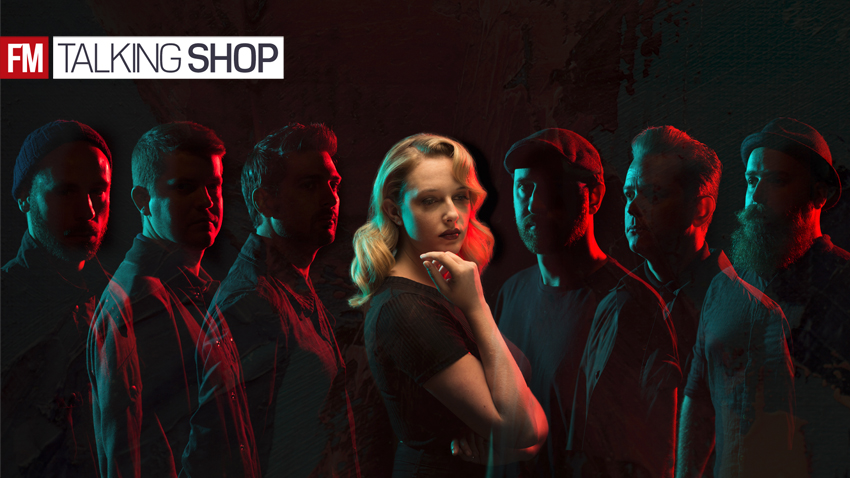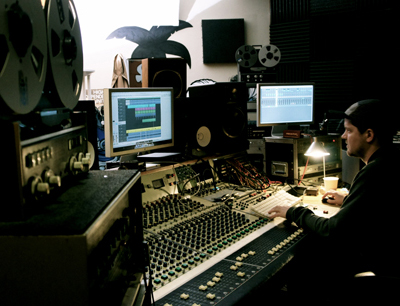Talking shop: Submotion Orchestra
Dom Ruckspin on album number three, Alium

With the release of their third album 'Alium' on the horizon, we catch up with producer, composer and 1/7th of Submotion Orchestra, Dom Ruckspin.
Since forming Leeds in 2009 Submotion Orchestra have carved out their own special place in the UK's ever-changing musical landscape. The 7 piece band's fusion of bass heavy electronica, jazz, soul and much more besides has made them a favourite of the likes of Gilles Peterson, Trevor Nelson and Jo Whiley, whilst their live show has seen them play festivals around the world and sell out venues such as London's famous KOKO.
When did you start making music, and how did you first get started?
"When I was about 14 I was introduced to a program called 'Rave eJay' which was essentially an 8-track toy for drag-and-drop loop organising. The only thing was that with Rave eJay, you could program your own synth arpeggios, and even import your own audio into the arrangement. It was exciting to see how far I could push the boundaries of the program and started making jungle remixes of everything from the Halloween theme to school interviews."
"I was listening to a lot of pirate radio and late-night radio 1 but I don't think I was specifically 'inspired' by anything in particular - I wasn't really trying to make anything professional. I was simply messing around and enjoying myself. I would say around the late 90s I was more 'pre-occupied' with producers such as Liam Howlett, Remarc, John B, DJ Hype, Leftfield, Goldie, etc, and completely obsessed with the 99p Moving Shadow mix CDs they used to sell in Bromley HMV. I guess that's how I really got into listening for production as opposed to just listening to music."
Tell us about your studio
"I'm in a bit of a transitional period at the moment. I've recently moved back to London after living in Leeds for 10 years, so at the moment a lot of stuff is still in boxes. In Leeds I shared a studio with Ryan ('Jack Sparrow') who I collaborated with for the 'Author' project."
Want all the hottest music and gear news, reviews, deals, features and more, direct to your inbox? Sign up here.
"I'm currently looking for a permanent residence to set up a live-in commercial studio, looking at various options including end-of-terrace flats and even houseboats. Most of the work I do is generally in-the-box but when I want to make use of some good microphones or analogue outboard I hire other studios such as Evergreen Studios in Turnpike Lane or Prince Fatty studios in Brighton. I have some really great Audeze headphones that are literally like having a mobile studio on my head, so that has really helped with the transitional studio vibe!"

What DAW (or DAWs) do you use, and why did you choose it?
"I started using Logic 5 about 10 years ago and haven't looked back since. I've tried using other programs but for me Logic is so straightforward I often get frustrated with how other DAW's over-complicate even basic functions like exporting audio. Logic is fairly CPU-hungry depending on your choice of plug-ins, but I have found some neat tricks to combat that, and the program generally seems to behave itself (although it struggles with the huge Submotion projects sometimes!). I think whatever DAW you use, as long as you know your way around, and you can create something quickly, your creativity should be able to flow as freely as possible."
What one piece of gear in your studio could you not do without, and why?
"At the moment I think it's a tie between my Audeze headphones and my Adam monitors. They both give me crystal clear audio and really help me balance my mixes properly. Other than that, the Pioneer DJM909 and the Roland RE20 space echo (pedal) are my two weapons of choice for live FX when I'm mixing live sound or dubbing out mixes. They both have a grainy warm saturation and controllability that works perfectly in any environment."
What's the latest addition to your studio?
"I recently picked up Native Instruments Kontakt, and I'm finding it really useful for cinematic trailers and orchestral scoring. I'm looking at getting a few more Kontakt instruments to load into the library, but with so many top quality libraries available it's really difficult to decide what to get!"
What dream bit of gear would you love to have in you studio?
"I recently tested out the overstayer NT02A saturator that was really good for helping to gel parts of the drums together, but I think my favourite piece of gear is the Empirical Labs Distressor. I'd love a stereo pair of those!"
When approaching a new track or project, where do you start?
"I think it's important to have a methodology when it comes to the finishing touches such as doing the final mix-down in the studio or mixing live sound. As for the creative process, anything can spark it off and the best results happen when you throw caution to the wind and just start with an idea, be it a sample or a rhythm or a sound or chord sequence or whatever."
What are you currently working on?
"The 3rd Submotion Orchestra album is due out in early November, which I'm quite excited about. We'll be touring Europe so I'll be doing live sound for the band in all kinds of venues - always a challenge! Aside from that, I'm working on more solo material, doing remixes and mix-downs for various projects, as well as doing the odd DJ gig here and there."
Dom's essential music making tips...
Save before you do anything risky
"Everyone always says 'don't forget to save' but it's easy to forget, and also you can't keep pressing cmd-S every minute if you're on a roll. The best thing to do is to save before you do anything risky like opening a new plugin, or move a large section of audio, or re-route stuff. Always have that fear that the next big change you make will cause problems, and you should be able to avoid it."
Reference your work
"It's easy to say, but sometimes when you get caught up in the mix-down you can end up chasing your tail without realising. Every now and then, listen to a track that you like, with a good balance or a similar mix to that which your aiming for. Listen to the stereo field, and the EQ balance, and drop the volume a few dB before listening to your (un-mastered) track. It may seem like an impossible task to get your track sounding like that which your aiming for, but at the very least you will have re-set your ears and you won't be working with too much of a general wonky EQ slope going on in your head."
It's not what you have - it's what you do with it that counts
"Dizzee Rascal's prize-winning album was largely made on a playstation. Skream has had platinum success using fruity-loops. Some of the most promising work I'm sent is by kids making music on headphones. Likewise some of the most awful music I've heard has been made in million-pound studios full to the brim with expensive hardware."
"Make the music you feel like making with whatever resources you can get your hands on. If you get good enough, real music fans will understand and appreciate it. In my opinion, if you make a good track and the mix-down is well-balanced, and you get the final premaster sent to a top mastering engineer, then your track will stand up to everything else out there, no matter what equipment you used to make it."


Future Music is the number one magazine for today's producers. Packed with technique and technology we'll help you make great new music. All-access artist interviews, in-depth gear reviews, essential production tutorials and much more. Every marvellous monthly edition features reliable reviews of the latest and greatest hardware and software technology and techniques, unparalleled advice, in-depth interviews, sensational free samples and so much more to improve the experience and outcome of your music-making.
